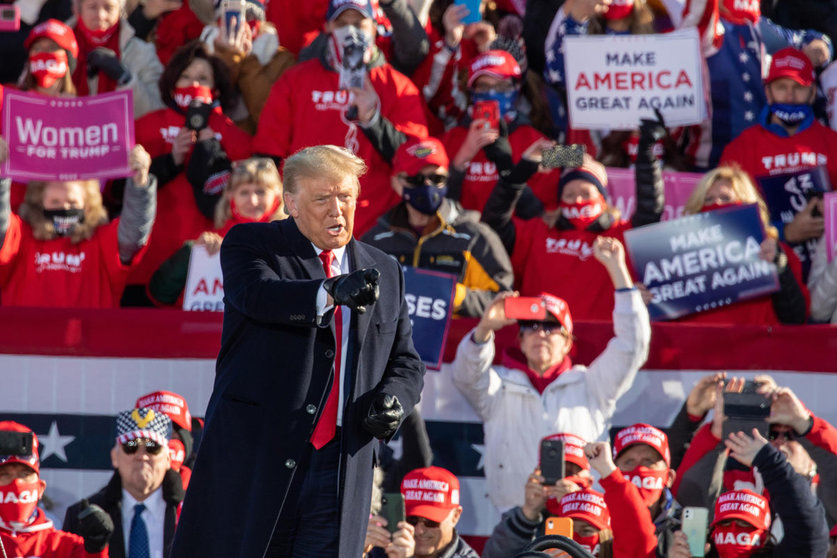As a president elected under the slogan "America First," Donald Trump did not make an easy partner for Europe, so if he fails in his re-election bid on Tuesday, there probably won't be too many sorry faces on the other side of the Atlantic.
"Most European countries would very much welcome a [Democratic Presidential candidate Joe] Biden victory," Ulrich Speck, a senior visiting fellow at The German Marshall Fund of the United States in Berlin, wrote in a recent policy brief.
This was because of "their widely shared perception of the Trump presidency as marking the lowest point in post-World War II transatlantic relations," Speck said.
Nathalie Tocci, director of the IAI think tank in Rome and a special advisor to EU foreign policy chief Josep Borrell, told: "the picture [of the current transatlantic relationship] is really disastrous, I don't know what else to call it."
The Trump presidency has torn up EU-backed international agreements like the Paris climate accord and the Iran nuclear deal, pulled out of the Geneva-based World Health Organization in the midst of the coronavirus pandemic, and called into question the usefulness of NATO.
'Big problem' with Germany
The sitting US president also wrong-footed Europe on the Middle East peace process and Syria, triggered a trade-sanctions row with the EU, called the bloc "a foe" on par with China and Russia, and said he had a "big problem with Germany," the continent's largest economy.
When asked to mention an area where Europe and the US cooperated successfully in recent years, Tocci struggled, before saying that NATO matters "did not go as badly as they could have done [...] maybe because he [Trump] did not follow the dossier personally."
Trump's go-it-alone, nationalist and erratic approach to foreign policy - perhaps, to policy in general - was difficult to square with the multilateral, gradualist model championed by the European Union.
"All that the EU represents, by definition, goes against [Trump's] vision of the world," Tocci argued.
The problem is "not only his visceral antipathy for multilateralism, of which the EU is the highest expression, but also his antipathy, equally visceral, for Germany."
'Artificial' trade war
Joe Biden - a former chairman of the Senate Committee on Foreign Relations and two-term vice-president under the Obama administration, with decades of foreign policy experience - is expected to be far more attuned to European sensitivities.
"The Biden foreign policy agenda will place the United States back at the head of the table, in a position to work with its allies and partners to mobilize collective action on global threats," the Democratic presidential nominee wrote in Foreign Affairs magazine.
One of his advisors, Tony Blinken, talked last month about ending the "artificial trade war" with the EU, while promising that a Democratic administration would still want to address imbalances in agricultural exports.
A Biden presidency would be expected to be more cooperative with Europe on various other fronts, starting with climate change, with a return to the Paris accords, and a renewed commitment to the NATO military alliance.
"First thing I'm going to have to do, and I'm not joking: if elected I'm going to have to get on the phone with the heads of state [of NATO allies] and say America's back, you can count on us," Biden told Star and Stripes, a newspaper for US troops.
In other moves that would be certainly welcome in Europe, Biden has pledged to rebuild diplomatic ties with the Palestinians and signaled he would be ready - under certain conditions - to re-enter the Iran nuclear deal.
On the other hand, he has said nothing about reversing another Trump decision that put most of the international community at odds with Washington: the transfer of the US embassy in Israel from Tel Aviv to Jerusalem.
End the 'forever wars'
More broadly, the US is expected to continue retreating from its global policeman role under Biden: he has pledged to "end the forever wars in Afghanistan and the Middle East," and - just like his predecessors - is likely to expect Europe to rely less on the US.
According to David O'Sullivan, a former EU ambassador to Washington, no president can ignore "the prevailing sense [in US public opinion] that America needs to take time out from running the world and spend more time nurturing its own well-being."
"We – the friends and allies of the United States – must also understand that we will have a part to play. We will need to do more to shoulder responsibility for our own defence and security," he wrote in a commentary for the European Policy Centre think tank.
German Chancellor Angela Merkel made a similar point when she told the Financial Times in January: "Europe needs to carve out its own geopolitical role and the United States' focus on Europe is declining. That will be the case with any president."
"There would still be points of friction" with Biden, Tocci said.
She specifically mentioned China and the US push back against Chinese economic encroachment in Europe. "But there would be a US reopening towards multilateralism and working in partnership - and our number one partner would no longer consider us public enemy number one."










